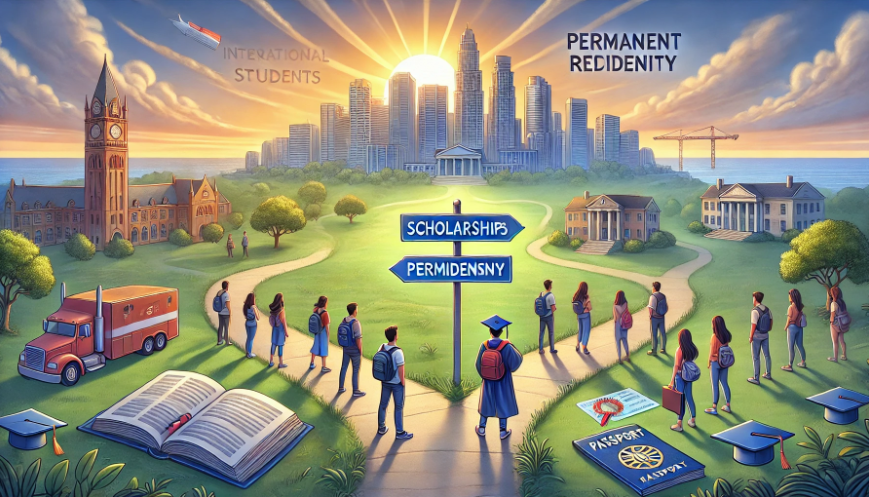Many international students who receive scholarships are motivated to study abroad by the prospect of high-quality education and the opportunity for a better life. Often, they wonder if they can transition from being international students to permanent residents in their host country, even while on scholarship. However, the possibility of applying for permanent residency (PR) depends on the country’s policies, scholarship terms, and the student’s individual situation. This article explores whether international students on scholarships can still apply for permanent residency and the factors that influence the process.
Can International Students with Scholarships Still Apply for Permanent Residency?
Yes, international students with scholarships can often apply for permanent residency, but the process depends on the immigration policies of the country where they studied. In many countries, having a scholarship does not disqualify students from applying for permanent residency, although there may be specific conditions they must fulfill.
For instance, some scholarship agreements require students to return to their home country for a period after completing their studies before they can apply for residency or re-enter the country on a different visa. However, many countries, especially those facing labor shortages or seeking to retain skilled graduates, have pathways that allow international students to transition to permanent residency, particularly if they have secured employment in a field that aligns with the nation’s economic needs.
Factors such as work experience, job offers, language proficiency, and contributions to the community can strengthen an application for permanent residency, making it possible for scholarship recipients to establish a long-term life in their host country.
Countries Where Scholarship Holders Can Apply for Permanent Residency
Countries have varying immigration policies regarding international students who wish to apply for PR. Here’s a look at some popular study destinations and their approaches:
Canada
Canada is one of the most welcoming countries for international students, with numerous pathways to PR through its immigration programs.
- Post-Graduation Work Permit (PGWP): After graduation, international students can apply for a PGWP, which allows them to work in Canada for up to three years. This work experience can strengthen their application for programs like the Canadian Experience Class (CEC) under the Express Entry system.
- Provincial Nominee Program (PNP): Several provinces in Canada, including Ontario, British Columbia, and Alberta, offer PR pathways specifically for international students who have studied and wish to work within the province.
As long as your scholarship does not have a requirement to return to your home country, Canada offers accessible PR options to international students.
Australia
Australia is also favorable for international students who wish to stay on after their studies and apply for PR.
- Temporary Graduate Visa (Subclass 485): This visa allows international students to gain work experience in Australia after completing their studies, an asset for PR applications.
- Skilled Migration Pathways: Australia’s PR system is points-based, and factors like age, qualifications, and English proficiency are essential. With a degree from an Australian institution, students may qualify for additional points and can apply for PR through the Skilled Independent Visa (Subclass 189) or Skilled Nominated Visa (Subclass 190).
Australia provides a clear pathway for international students, but those on government scholarships should confirm they have no home return requirements.
United States
The U.S. has limited direct pathways from student visas to PR, though there are options for those who gain relevant work experience.
- Optional Practical Training (OPT): OPT allows international students to work in the U.S. for up to three years (for STEM students), potentially leading to employer sponsorship for a work visa (H-1B). Sponsorship can lead to PR through employer-based green cards, though this process may take several years.
- Diversity Visa (DV) Lottery: Some international students apply for the U.S. Diversity Visa Lottery to gain PR if eligible, though it is not guaranteed and depends on nationality and selection.
The U.S. PR options are less direct, and scholarships funded by U.S. agencies, such as the Fulbright Program, often require students to return to their home country for at least two years after graduation.
United Kingdom
In the UK, PR is known as Indefinite Leave to Remain (ILR), and the pathway to ILR for international students typically includes work experience.
- Graduate Route: This visa allows international students to remain in the UK for two years after graduation (three years for doctoral students) to gain work experience.
- Skilled Worker Visa: After gaining work experience on the Graduate Route, students may qualify for a Skilled Worker Visa, a key step toward ILR.
- Return Requirements: Some UK-based scholarships, like the Chevening Scholarship, require students to return to their home country for two years. This requirement must be met before students can apply for any long-term visa or ILR in the UK.
The UK has viable PR options, but scholarship holders with return obligations must complete these before pursuing ILR.
Germany
Germany offers a straightforward route for international students to apply for PR, known as a Settlement Permit, after gaining work experience.
- Residence Permit for Job Seekers: International graduates can apply for an 18-month residence permit to find a job in Germany. After securing employment, they can then apply for a settlement permit.
- EU Blue Card: Graduates who meet certain income and qualification requirements can apply for an EU Blue Card, which can lead to PR after 33 months (or 21 months with adequate language proficiency).
Germany’s policies are supportive of international students’ transition to PR, but it’s essential to confirm any scholarship-specific restrictions.
Key Factors Influencing PR Eligibility for Scholarship Holders
When deciding to apply for PR, scholarship holders should consider these important factors:
Work Experience Requirements
Some countries require a minimum period of work experience before students can apply for PR. Understanding these requirements early on can help students make informed decisions about post-graduation work.
Language Proficiency
In countries like Canada, Australia, and Germany, language proficiency is a key PR requirement. Students should take advantage of their study period to build language skills, which can ease their transition from student visas to PR.
Point-Based Systems
Countries like Australia and Canada use point-based systems to assess PR eligibility. Students can gain extra points for factors like local education, work experience, language proficiency, and age.
Scholarship Conditions
If the scholarship has return requirements, students must adhere to these before applying for PR. Violating these terms can lead to financial penalties, travel restrictions, or ineligibility for future scholarships or visas.
Frequently Asked Questions (FAQs)
1. Can I apply for PR if my scholarship requires me to return home?
No, if your scholarship includes a requirement to return home, you must fulfill this obligation first. Some countries allow you to reapply for PR later, but you may need to work in your home country for a few years to meet the scholarship conditions.
2. Will my scholarship impact my eligibility for PR?
Your scholarship itself doesn’t affect PR eligibility, but the conditions attached to it might. Review your scholarship terms carefully and, if possible, consult your scholarship provider about future PR plans.
3. Can work experience during my studies count toward PR requirements?
Yes, in some countries, part-time or internship work during studies can count toward PR applications, particularly if the experience is relevant to your field.
4. Are there options to waive the return requirement for scholarships?
In some cases, students may petition for a waiver of their return requirement if they have a compelling reason, such as a job offer or an exceptional personal situation. However, waivers are not guaranteed and may depend on your scholarship provider’s policies.
Final Thoughts
While scholarship recipients face certain conditions, the option to apply for permanent residency remains accessible in many countries if approached strategically. By understanding your scholarship terms, country-specific requirements, and eligibility pathways, you can create a roadmap for transitioning from a scholarship student to a permanent resident in your host country.



No Comment! Be the first one.